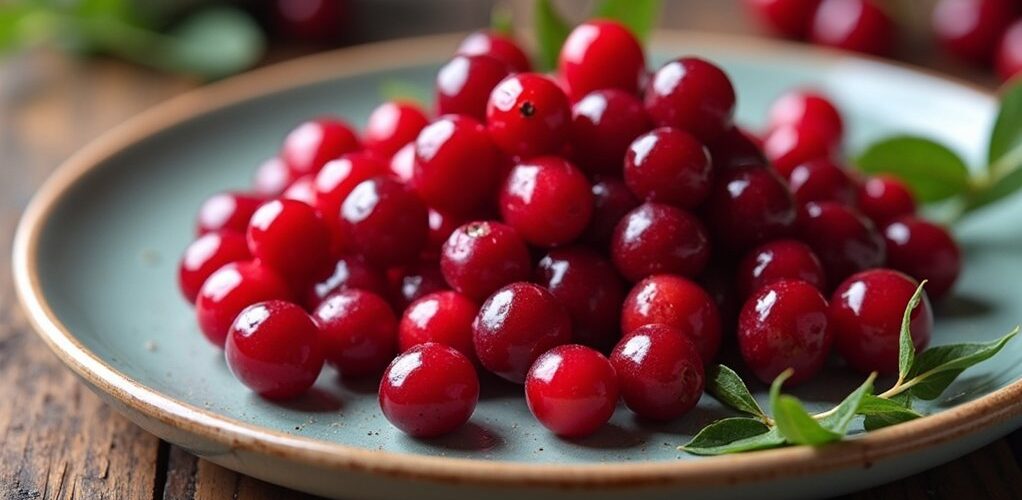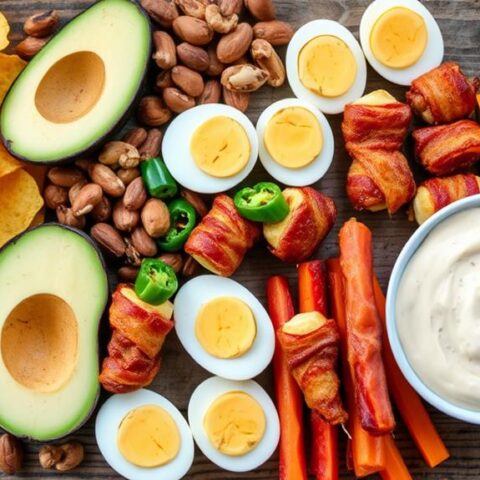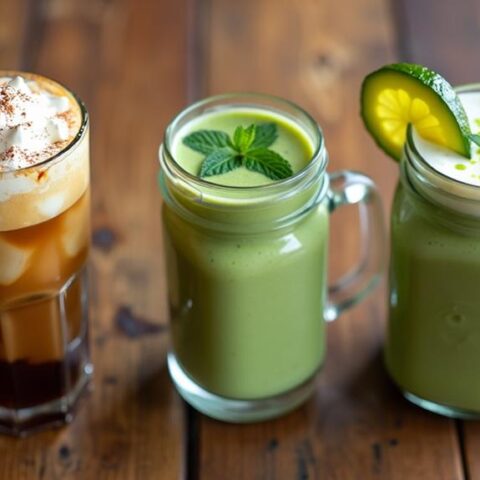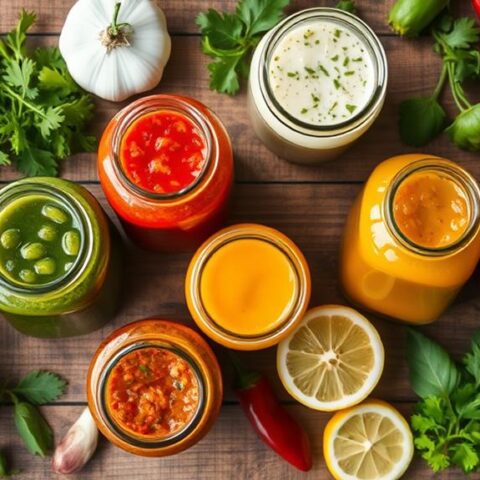
Cranberries contain moderate carbohydrate levels, with 12.2g total carbs and 8.37g net carbs per 100g serving. While not strictly low-carb, fresh cranberries can fit into a low-carb diet when portions are carefully controlled. Dried cranberries and sweetened cranberry products have considerably higher carb content, with dried versions containing up to 81g total carbs per 100g. Understanding proper portion sizes and preparation methods reveals how to effectively incorporate these tart berries into a balanced diet.
Key Takeaways
- Fresh cranberries contain 12.2g total carbohydrates per 100g, with 8.37g net carbs after subtracting fiber content.
- Raw cranberries are moderately high in carbs, representing over 40% of daily carb allowance for strict keto dieters.
- Dried cranberries are significantly higher in carbs, containing about 81g total carbs per 100g serving.
- Small portions of raw cranberries (under 50g) can fit into low-carb diets with careful monitoring.
- Sugar-free cranberry preparations and natural sweeteners like erythritol can make cranberries more low-carb friendly.
The Carbohydrate Profile of Cranberries
Understanding the carbohydrate composition of cranberries is essential for those monitoring their dietary intake. In a 100g serving, cranberries contain 12.2g of total carbohydrates, including 3.83g of dietary fiber, resulting in 8.37g of net carbs. This amount represents over 40% of the daily carb allowance for those following a strict ketogenic diet. While fresh cranberries have moderate carbohydrate content, processed forms like dried cranberries and cranberry sauce present greater concerns for low-carb dieters. Dried cranberries typically include added sugars, while cranberry sauce contains 39.3g of net carbs per 100g serving. It's important to avoid cranberry sauce as its high sugar content can disrupt ketosis. For those seeking lower-carb alternatives, raspberries and blackberries offer similar flavors with substantially lower net carbs, containing 5.44g and 4.31g per 100g serving, respectively.
Net Carbs Vs Total Carbs in Cranberries
The distinction between net carbs and total carbs in cranberries marks a significant consideration for individuals following carbohydrate-restricted diets.
While a 100g serving of cranberries contains 12.2g of total carbs, the presence of 3.83g dietary fiber reduces the net carb content to 8.37g, which is still substantial for those on a ketogenic diet.
For keto dieters limited to roughly 20g of daily carb intake, cranberries' high net carb content poses a challenge, as a single serving accounts for over 40% of their daily allowance.
The situation becomes more pronounced with cranberry sauce, which contains approximately 39.3g of net carbs per 100g serving due to added sugars, making it particularly problematic for maintaining ketosis.
Fresh Vs Dried Cranberries: a Carb Comparison
Comparing fresh and dried cranberries reveals striking differences in their carbohydrate content, with dried varieties containing nearly seven times more total carbohydrates than their fresh counterparts. This significant variance makes dried cranberries particularly challenging for those following a low carb diet or ketogenic lifestyle.
| Comparison | Fresh Cranberries | Dried Cranberries | Impact on Diet |
|---|---|---|---|
| Total Carbs | 12.2g/100g | 81g/100g | High variance |
| Net Carbs | 8.37g/100g | >70g/100g | Diet limiting |
| Sugar Content | Low | Very High | Blood sugar impact |
| Serving Size | 1 cup | 1/4 cup | Portion control |
| Diet Suitability | Moderate carb | High carb | Diet consideration |
While fresh cranberries can be incorporated into most eating plans in moderation, their dried counterparts should be limited or avoided by those monitoring carbohydrate intake due to concentrated sugar content.
Fitting Cranberries Into a Low-Carb Diet
Successfully incorporating cranberries into a low-carb diet requires careful attention to portion sizes and diligent tracking of daily carbohydrate intake.
Health-conscious individuals can explore alternatives like sugar-free cranberry preparations or lower-carb berry substitutes to maintain their dietary goals while enjoying similar flavors.
Those following strict low-carb diets should consider measuring their cranberry portions precisely and balancing them against other daily carb sources to stay within their prescribed limits.
Portion Control Is Key
Managing cranberry portions carefully becomes essential when incorporating these tart berries into a low-carb eating plan, as even modest servings can greatly impact daily carbohydrate limits. With 8.37g of net carbs per 100g serving, fresh cranberries must be measured precisely to maintain strict keto guidelines. Small servings help control carbohydrate consumption while still allowing enjoyment of their unique flavor.
| Food Type | Serving Size | Net Carbs |
|---|---|---|
| Fresh Cranberries | 100g | 8.37g |
| Cranberry Sauce | 100g | 39.3g |
| Raw Cranberries | 50g | 4.19g |
| Dried Cranberries | 100g | 82.8g |
The significant carb content in cranberries necessitates careful measurement and consideration within a low-carb diet framework, making portion control the key to successfully including these berries while maintaining dietary goals.
Smart Substitution Strategies
Beyond careful portion control, low-carb dieters can embrace strategic substitutions to include cranberries in their meal plans. When making homemade sauce, sugar substitutes like erythritol can dramatically reduce net carbs to approximately 4 grams per quarter-cup serving, making it a more diet-friendly option.
For those following stricter low-carb protocols, substituting cranberries with raspberries or blackberries offers similar tartness while providing fewer net carbs per serving.
Creative alternatives include using cranberry flavor extracts or combining minimal amounts of cranberries with complementary herbs and spices to maximize flavor impact without excessive carbohydrates.
These smart adjustments allow individuals to enjoy the distinct taste of cranberries while maintaining their dietary goals through thoughtful portion sizes and ingredient modifications.
Track Daily Carbs Carefully
When incorporating cranberries into a low-carb eating plan, precise tracking of daily carbohydrate intake becomes vital for maintaining dietary goals. With raw cranberries containing 8.37g of net carbs per 100g serving, individuals following a strict keto diet must carefully monitor their portions to stay within their daily carb limits.
Utilizing tracking tools and apps can help measure macronutrient intake accurately, ensuring that cranberry consumption doesn't exceed recommended allowances.
For those seeking greater dietary flexibility, lower-carb alternatives like raspberries or blackberries can provide similar nutritional benefits with fewer carbohydrates. Portion control remains essential, particularly when consuming cranberry-based products, as prepared items like cranberry sauce can contain markedly higher amounts of net carbs, potentially disrupting carefully planned low-carb meal strategies.
Health Benefits Beyond the Carb Count
Although cranberries are often scrutinized for their carbohydrate content, these tart berries offer an impressive array of health benefits that extend far beyond their nutritional macronutrients.
Research shows that cranberries are packed with antioxidants, particularly proanthocyanidins, which help prevent urinary tract infections by inhibiting bacterial adhesion. Their high vitamin C content supports immune function, while their rich dietary fiber promotes digestive health and cholesterol management.
Studies indicate that cranberry consumption may contribute to cardiovascular wellness through improved blood vessel function. Additionally, these berries contain compounds like ursolic acid that show promise in cancer prevention, with laboratory evidence suggesting they may help inhibit cancer cell proliferation.
The polyphenols in cranberries have also demonstrated potential in reducing blood vessel thickening, supporting long-term heart health.
Seasonal Alternatives to High-Carb Cranberry Products
For individuals following low-carb diets during the holiday season, numerous alternatives to traditional cranberry products can satisfy seasonal cravings while maintaining dietary goals. While fresh cranberries contain 8.37g of net carbs per 100g, making them usable in moderation, traditional cranberry sauce packs a hefty 39.3g of net carbs, necessitating alternatives for strict low-carb adherents. Homemade raspberry compote sweetened with erythritol offers a viable solution at only 5.44g net carbs per 100g. Blackberries present another excellent option, containing just 4.31g of net carbs per 100g. For those seeking the signature tartness of cranberries without the carb load, incorporating lemon zest or juice can provide similar flavor notes while maintaining dietary balance. These alternatives allow for festive food choices without compromising low-carb lifestyle goals. Additionally, managing blood sugar through low-carb options like these can support healthier metabolic outcomes during the holiday season.
Recipe Modifications for Lower Carb Cranberry Dishes
Several practical modifications can transform traditional cranberry recipes into low-carb alternatives without sacrificing their distinctive holiday appeal.
By replacing conventional sweeteners with sugar substitutes like erythritol or stevia, cooks can greatly reduce the net carb count while maintaining desired sweetness. Incorporating low-carb fruits such as raspberries or blackberries alongside cranberries helps decrease overall carbohydrate content while enhancing flavor complexity. Monk fruit, derived from Siraitia grosvenorii, is another excellent sweetener option that is zero-calorie and zero-carb, making it suitable for low-carb cranberry dishes. Careful attention to portion sizes guarantees dishes remain within acceptable carb limits, while natural flavor enhancers like lemon zest and cinnamon add depth without increasing carbs.
Mindful ingredient swaps and creative fruit pairings allow traditional cranberry dishes to align perfectly with low-carb dietary goals.
Creating homemade versions of cranberry dishes allows for complete control over ingredients, eliminating hidden carbs often found in store-bought alternatives.
These recipe modifications enable enjoyment of traditional cranberry dishes while adhering to low-carb dietary requirements.
Blood Sugar Impact of Cranberry Consumption
Understanding the blood sugar impact of cranberries becomes particularly relevant when adapting recipes for dietary needs. With 8.37 net carbs per 100g serving, raw cranberries require careful portion control for those monitoring their carb limit.
The high carbohydrate content becomes especially concerning in sweetened preparations like cranberry sauce, which contains 39.3g of net carbs per 100g.
Despite their impact on blood sugar levels, the health benefits of eating cranberries shouldn't be overlooked. Unsweetened cranberry juice has shown promise in improving cardiovascular health, while the fruit's proanthocyanidins support urinary tract health.
For those seeking to balance these benefits with blood sugar management, focusing on controlled portions of fresh cranberries or sugar-free preparations can help maintain stable glucose levels while still enjoying cranberries' nutritional advantages.
Portion Control Guidelines for Cranberry Lovers
For cranberry enthusiasts following a ketogenic lifestyle, precise portion measurement becomes essential, as even a 100g serving contains 8.37g of net carbs, potentially consuming over 40% of a daily carb allowance.
Health-conscious individuals should limit their cranberry portions to 50g or less, while utilizing tracking apps to monitor their daily carbohydrate intake accurately.
Those seeking similar flavors with lower carb impact might consider alternatives like raspberries or strawberries, which contain approximately 5.5g of net carbs per 100g serving.
Measuring Cranberry Serving Sizes
Precise measurement of cranberry servings plays an essential role in maintaining dietary goals, particularly for individuals following carbohydrate-restricted eating plans.
Using proper measuring tools, such as food scales and measuring cups, helps consumers accurately track their carbohydrate intake when enjoying cranberries. With 8.37g of net carbs per 100g serving of fresh cranberries, careful portion control becomes vital for those monitoring their daily limits.
Special attention should be paid when measuring cranberry sauce, as a quarter-cup serving contains approximately 22g of net carbs, which can quickly exceed the restrictions of low-carb diets.
Those following a ketogenic diet should be especially vigilant, considering that even small servings of cranberries can constitute a significant portion of their daily 20g carbohydrate allowance.
Daily Net Carb Tracking
Maintaining a detailed record of net carb consumption becomes particularly important when incorporating cranberries into a carbohydrate-conscious diet. With a 100g serving containing 8.37g of net carbs, portion sizes must be limited to stay within daily targets, especially for those following strict ketogenic protocols.
For effective tracking of cranberry consumption, individuals should:
- Keep serving sizes under 50g to minimize carb impact
- Log food intake using dedicated apps or tools
- Consider lower-carb alternative fruits like raspberries
Daily net carb tracking helps individuals make informed decisions about incorporating cranberries into their meals while maintaining their dietary goals.
When traditional cranberry products prove too carb-heavy, utilizing sugar substitutes in recipes can provide satisfying alternatives that align with carbohydrate restrictions.
Natural Sweetener Options for Cranberry Recipes
While traditional cranberry recipes often rely on sugar for sweetness, natural alternatives like erythritol and stevia offer excellent options for creating low-carb versions of favorite cranberry dishes. These natural sweeteners greatly reduce carbohydrate content while maintaining desirable taste profiles. Erythritol, containing just 0.24 calories per gram, doesn't affect blood sugar levels, making it particularly suitable for low-carb diets. When combined with stevia, these sweeteners create a balanced flavor that closely resembles sugar without the carb impact. Recipe substitutions require careful measurement adjustments, as stevia's potency means a single teaspoon can replace an entire cup of sugar. This combination allows for the creation of delicious cranberry recipes that align with low-carb dietary goals while preserving the authentic taste experience. For those maintaining a ketogenic lifestyle, incorporating these sweeteners ensures desserts that satisfy cravings without disrupting ketosis.
Making Smart Choices With Cranberry Products
To successfully incorporate cranberries into a low-carb eating plan, consumers must carefully evaluate the carbohydrate content across different cranberry products.
Making smart choices involves understanding that fresh cranberries contain moderate net carbs, while dried varieties and traditional cranberry sauce can greatly impact daily carbohydrate limits.
For those following a low-carb diet, here are essential considerations:
- Choose fresh cranberries over dried versions, as they contain fewer net carbs and no added sugars.
- Make homemade cranberry sauce using sugar substitutes like erythritol to reduce carbohydrate content.
- Practice portion control when consuming any cranberry products, measuring servings carefully to stay within daily carb limits.
Understanding these distinctions enables consumers to enjoy cranberries while maintaining their low-carb lifestyle through informed product selection and preparation methods.
Nutritional Value and Mineral Content
Cranberries offer a robust nutritional profile with key minerals like potassium (80.0mg), calcium (8.0mg), and magnesium (6.0mg) per 100g serving, supporting essential bodily functions from muscle health to bone strength.
The berries contain significant vitamin content, especially Vitamin C at 14.0mg per serving, which provides 35% of the daily recommended intake for adults, along with trace amounts of Vitamins A, E, and B complex.
Despite their relatively low caloric content of 46.0kcal per 100g, cranberries deliver a concentrated source of nutrients and antioxidants while maintaining a moderate carbohydrate profile of 12.2g total carbs, with 3.83g of beneficial dietary fiber.
Key Mineral Profile Statistics
The mineral profile of fresh cranberries reveals a modest yet significant nutritional composition, with 100g containing 80.0mg of potassium, 8.0mg of calcium, and 6.0mg of magnesium.
While cranberries contain 8.37g of net carbs per serving, their mineral content contributes to their overall nutritional value, making them a nutrient-dense option at only 46.0 calories per 100g serving.
Key mineral statistics for cranberries include:
- Potassium content of 80.0mg, supporting heart and muscle function
- Calcium content of 8.0mg, contributing to bone health
- Magnesium content of 6.0mg, essential for energy metabolism
These minerals, combined with 14.0mg of vitamin C, create a thorough nutrient profile, though consideration should be given to their net carb content when following a low carb or keto diet.
Essential Daily Nutrient Values
When considering the essential daily nutrient values of cranberries, their nutritional profile reveals considerable contributions across multiple categories, with particular emphasis on vitamins and minerals.
While their carbohydrate content may present challenges for those following a strict low carb diet, cranberries offer substantial health benefits through their vitamin content, including 14.0mg of vitamin C, 3.0µg of vitamin A, and 1.32mg of vitamin E.
The mineral composition further enhances their nutritional value, providing 80.0mg of potassium, 8.0mg of calcium, and 6.0mg of magnesium per 100g serving.
It's worth noting that while fresh cranberries maintain these beneficial properties, dried varieties often contain added sugar, which can considerably alter their nutritional profile and impact their suitability for restricted diets.
Antioxidant Content Distribution
Among the most significant nutritional attributes found in these vibrant berries, antioxidant compounds contribute substantially to their health-promoting properties. Cranberries, while containing 8.37g of net carbs per serving, pack a powerful punch of polyphenols and other protective compounds that combat oxidative stress in the body.
The distribution of antioxidants in cranberries includes:
- Vitamin C content of 14.0mg per 100g serving, supporting immune function
- Flavonoids and proanthocyanidins, which help reduce inflammation
- Anthocyanins, specifically linked to improved cardiovascular health
These antioxidant compounds work synergistically with the berries' mineral content, including potassium, calcium, and magnesium, to provide extensive health benefits.
Research continues to demonstrate the importance of these compounds in managing oxidative stress and supporting overall wellness.
Best Practices for Including Cranberries in Your Diet
Successfully incorporating cranberries into a diet requires careful consideration of both portion sizes and preparation methods, particularly for those monitoring their carbohydrate intake. With approximately 8.37g of net carbs per 100g serving, cranberries should be consumed in moderation, especially on low-carb or keto-friendly eating plans. To balance their natural tartness while maintaining carb limits, pair fresh cranberries with nuts or cheeses, and opt for recipes that utilize sugar alternatives like erythritol. When selecting cranberry products, carefully examine labels for added sugars, as many commercially prepared items contain significant amounts that can derail carbohydrate goals. Recognizing serving sizes ensures accurate nutrient tracking, as many packaged foods contain multiple servings. Creating homemade low-carb versions of cranberry favorites, such as sugar-free cranberry sauce, allows for better control over net carbs while still enjoying these nutritious berries.
Frequently Asked Questions
Can You Eat Cranberries on a Low Carb Diet?
Fresh cranberries offer health benefits but contain higher carbs than fruit alternatives like berries. Through portion control and modified cranberry recipes using sugar substitutes, they can fit into low-carb diets in moderation.
Do Cranberries Have Less Sugar Than Raisins?
Fresh cranberries contain considerably less sugar than raisins, with 4g versus 59g per 100g serving. This stark nutritional difference makes cranberries a better choice for those monitoring sugar intake.
How Many Carbs Are in Cranberries?
Fresh cranberries contain 12.2g total carbohydrates per 100g serving, with 3.83g dietary fiber, resulting in 8.37g net carbs. Dried varieties and cranberry juice typically have considerably higher carbohydrate content.
Are Dried Cranberries Keto-Approved?
Dried cranberries are not keto-approved due to their high carb count and sugar content. Their nutrition facts reveal excessive carbohydrates that exceed keto diet limits. Healthier snacks include fruit substitutes like unsweetened coconut.
Conclusion
Cranberries can indeed fit into a low-carb lifestyle when consumed thoughtfully and in appropriate portions. Fresh cranberries offer the most favorable carb profile, while dried versions and sweetened products should be limited. By choosing the right forms, monitoring serving sizes, and exploring sugar-free preparation methods, health-conscious individuals can enjoy cranberries' impressive nutritional benefits while maintaining their low-carb goals. The key lies in mindful selection and preparation of cranberry products.










No Comments